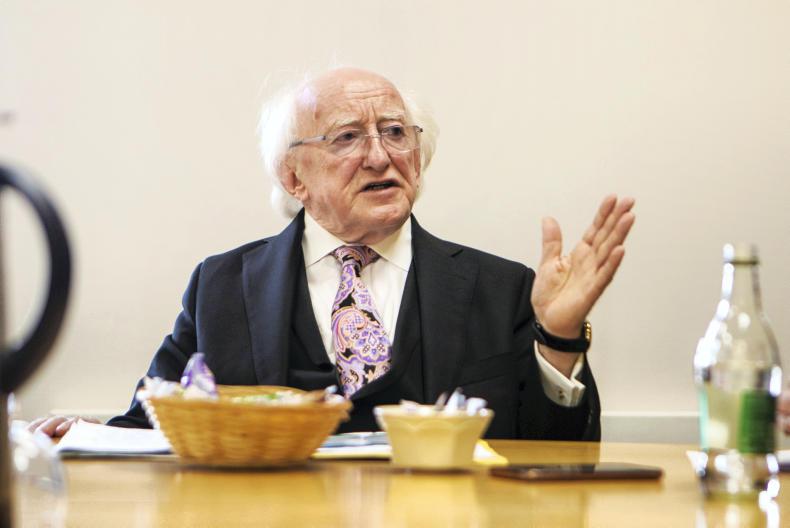The story of the presidential election was undoubtedly Peter Casey, who garnered almost a quarter of the votes cast. His vote was strongest in rural Ireland. Why?
Personally, I found Casey’s remarks reprehensible, opportunist and intolerant. However, I understand the frustration people are feeling. It’s not about broadband or our rubbish country roads or the rubbish on the roadsides from fly-tipping or the lack of policing, although all those things feed into how people are feeling. It's not about the Travelling community. It's about fairness and free-loaders. Casey's comments, by accident or design, triggered a response from people who themselves are not bigots.
The coping classes are stretched to breaking point. They prioritise their children's education to give them the best chance in life, but the jobs are in Dublin, where houses are not affordable for people on average wages.
Imagine for a second that you are on the way home from working a 12-hour shift, or filling the car with diesel after a long day on the farm. In the forecourt is a youngster you know who has never worked a day in their life, and probably never will, driving a newer car than yours.
On the radio you hear of Superintendent David Taylor, suspended following highly critical findings in the Disclosures Tribunal, who may be allowed to retire on full pension.
You had a meeting yesterday with your child’s principal about an unsatisfactory teacher in a vital subject and have been advised to get them grinds (for cash) as there is nothing the principal can do.
Meanwhile, you fear a Department of Agriculture inspection, where a relatively trivial error could lead to a penalty that hammers your income.
Your partner works for the HSE, where wonderful people are struggling to cope with a broken system.
The banks that you helped to bail out through your taxes are sending threatening letters to half the people you know, and a small slip can leave you vulnerable to a vulture fund.
You lie awake wondering how you can afford to insure your eldest on the car – it'll cost a couple of months' wages in part because of fraudulent claims and excessive payment awards from judges. Even if you manage that, you still have to drive them to their weekend job and training and socialising because Shane Ross has decided that L drivers can't be out on their own. Maybe he'll send the LUAS out for them instead.
The simple narrative would be to present rural people as backward, and lacking knowledge and insight regarding the diversity and complexity of modern Irish society, but that is bogus.
The average rural dweller meets people from every conceivable demographic at the local school gate, GAA pitch or pub. There are less people, but as a result we are all herded together rather than being divided up like the homogenous urban tribes where people are surrounded by those of the same socio-economic background (and frequently opinions). There may actually be more osmosis of ideas and perspectives in the country than the city.
Warnings
And then the commentariat scoffs at you for feeling frustrated and angry and wanting to send a message. The message is ignored. What next?
The warnings have been coming from rural Ireland for some time. Dissatisfaction in rural areas has seen the election of the Healy-Raes, Ming Flanagan, Michael Fitzmaurice and many others. These politicians span across the political spectrum, but they get the everyday concerns of the people they represent.
It's true that many of the politicians in the mainstream parties also understand and make sympathetic noises in rural halls at meetings, but they don’t seem to be getting the point across in Dublin. Leo Varadkar said he wanted to represent people who get up early in the morning. They'd want delivery on that commitment.
The danger does not come from extreme elements in the media fanning the flames of extreme opinions, or of extreme politicians. We have always had them. The danger comes from people feeling the mainstream media and mainstream politicians no longer speak for them, and look elsewhere for voices that resonate.
It’s also true that many people who sincerely believed abortion and same-sex marriage should not have been legalised were made to feel that they barely had the right to express such an opinion, only adding to the sense of alienation.
But don't think for a second that this was a "grey revolution", a lot of younger people voted for Peter Casey too. That should concern our political leaders more.
One US senator, John Kennedy from Louisiana (a Republican, but a rational one), summed up this phenomenon well in recent days. He spoke of the anger of Middle Americans “who are giving bailouts to those above them and handouts to those below them". Ordinary working people, farmers included, feel that they are carrying everyone else around on their backs, and are being slowly overwhelmed.
That’s what Peter Casey tapped into, albeit with language that was dangerously intolerant.
Ireland is unlikely to become as broken a body politik and divided a society as the US, but the people in the middle feel forgotten. The two main political parties are turning their nose up at Peter Casey, for entirely understandable reasons. But it is important that they reach out to the people who voted for him.






 This is a subscriber-only article
This is a subscriber-only article










SHARING OPTIONS: